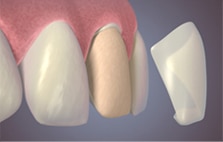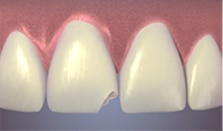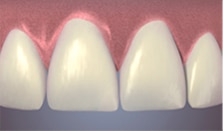-
-

BRUSHING & FLOSSING
How to BrushWhat Is the Right Way to Brush?
Proper brushing takes at least two minutes — that's right, 120 seconds!...

BRUSHING & FLOSSING
How To FlossWhat is the Right Way to Floss?
Proper flossing removes plaque and food particles in places where a toothbrush cannot easily reach... -
Science & Innovation
- Home
- Oral Health
- Are There Other Alternatives For Improving My Smile?


Tooth whitening can help brighten your smile but it is not suitable for everyone. Bleaching is not recommended if you have tooth-coloured fillings, crowns, caps or bonding in your front teeth as the bleach will not change the colour of these materials, making them stand out in your newly whitened smile. In these cases, you may want to investigate other options, like veneers or bonded restorations.
- Veneers are thin pieces of porcelain or plastic bonded to the front of your teeth. For teeth that are severely discoloured, chipped or misshapen, they can create a pleasing smile.

There are two types of veneers:
- Porcelain (indirect) veneers require preparation of your tooth and then construction in a dental laboratory. It usually takes two visits to the dentist. They can last 10-15 years, or more.
- Composite (direct) veneers are bonded to your tooth in a single visit. Composite veneers cost significantly less, but may only last 5-7 years.
 Chipped tooth.
Chipped tooth.
 Tooth after bonding to repair the chip.
Tooth after bonding to repair the chip.
Bonded restorations use composite resin to restore chipped or broken teeth, fill in gaps and reshape or recolour your smile. After applying a very mild etching solution that slightly roughens the surface of your teeth, permitting the bonding material to adhere, your dentist applies the resin and sculpts, colours and shapes it to provide a pleasing result. A high-intensity light hardens the material, which is then finely polished.
- Many people choose bonding over silver fillings because it looks more natural; the material can be matched to your natural tooth colour.
- The disadvantages of bonding versus silver fillings are that they cost more, are more difficult to place and less resistant to fracture and wear.
Your dental professional can tell you if you are a good candidate for veneers or bonded restorations.
Related Articles

Dental veneers are thin pieces of tooth-coloured porcelain or composite resin material that are bonded to the facial (front) surfaces of your natural teeth.

People with healthy smiles like to show them off, but for people with chipped, discoloured or crooked teeth, smiling can be a painful experience, emotionally and physically.

This article is intended to promote understanding of and knowledge about general oral health topics. It is not intended to be a substitute for professional advice, diagnosis or treatment. Always seek the advice of your dentist or other qualified healthcare provider with any questions you may have regarding a medical condition or treatment.
Related Products

Helping dental professionals
More professionals across the world trust Colgate. Find resources, products, and information to give your patients a healthier future








